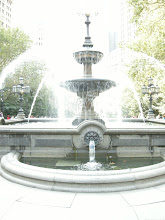 "The City Hall area is better off now and it's a great location."
"The City Hall area is better off now and it's a great location."-Pete Hamill
"New York is a place where you can't judge often what people think."
-Pete Hamill
"Music is one of the great triggers."-Pete Hamill
"Some people are New Yorkers the day they show up."
-Pete Hamill
"Youth needs the possibility of romance," Pete Hamill wrote in his book Downtown: My Manhattan.
I'll admit it. I was jealous. New York was my city, my secret love. And now this 73-year old writer named Pete Hamill felt that same possibility of romance with its sleek buildings, its tough character and its rich history!
But I got so caught up in the wonders of Downtown - in which Hamill wove his own personal New York narrative together with the separate, intricately detailed threads of the city's history - that my outrage had faded when I finished it a few days later. Instead, I was pretty impressed.
My respect for Hamill increased tenfold when he visited my journalism class on Wednesday and spoke about his personal writing process. For Hamill, language beats to a musical rhythm. He walks around, collects his memories, jots down ideas on a yellow pad and strings together his words in a steady cadence that captures meaning and emotion and possibilities.
The ability to help others represents one of writing's possibilities, Hamill said. He said this notion arose from a past memory in which his mother admonished, "Don't you ever look down on anybody unless you're giving them a hand to get up."
This influenced the first piece he ever wrote, which was about an evicted Williamsburg tenant. Readers then found both job offers and a place to live for the evicted man, Hamill said. This desire to help people guided Hamill throughout his entire journalistic career, in which he wrote for the New York Post, the New York Daily News, and New York Newsday, the Village Voice, New York magazine and Esquire.
Don't let all of those publications and all of Hamill's sucesses intimidate you, though. In journalism class, Hamill was both friendly and patient. But the thing that really stood out to me, the thing that really made me feel like I could understand a little bit more about him than I had previously, was this:
"Within the label of poverty, there were dozens of people who were not impoverished," he said.
The public library, filled with paperback fictions and tomes of knowledge, represented the most important place in Hamill's life. And what he meant was that although he may not have been monetarily rich, Hamill felt rich whenever he went to that library and immersed himself in another literary adventure.
And for that, I highly respect and admire Pete Hamill, even if he is having a love affair with my city.
I'll admit it. I was jealous. New York was my city, my secret love. And now this 73-year old writer named Pete Hamill felt that same possibility of romance with its sleek buildings, its tough character and its rich history!
But I got so caught up in the wonders of Downtown - in which Hamill wove his own personal New York narrative together with the separate, intricately detailed threads of the city's history - that my outrage had faded when I finished it a few days later. Instead, I was pretty impressed.
My respect for Hamill increased tenfold when he visited my journalism class on Wednesday and spoke about his personal writing process. For Hamill, language beats to a musical rhythm. He walks around, collects his memories, jots down ideas on a yellow pad and strings together his words in a steady cadence that captures meaning and emotion and possibilities.
The ability to help others represents one of writing's possibilities, Hamill said. He said this notion arose from a past memory in which his mother admonished, "Don't you ever look down on anybody unless you're giving them a hand to get up."
This influenced the first piece he ever wrote, which was about an evicted Williamsburg tenant. Readers then found both job offers and a place to live for the evicted man, Hamill said. This desire to help people guided Hamill throughout his entire journalistic career, in which he wrote for the New York Post, the New York Daily News, and New York Newsday, the Village Voice, New York magazine and Esquire.
Don't let all of those publications and all of Hamill's sucesses intimidate you, though. In journalism class, Hamill was both friendly and patient. But the thing that really stood out to me, the thing that really made me feel like I could understand a little bit more about him than I had previously, was this:
"Within the label of poverty, there were dozens of people who were not impoverished," he said.
The public library, filled with paperback fictions and tomes of knowledge, represented the most important place in Hamill's life. And what he meant was that although he may not have been monetarily rich, Hamill felt rich whenever he went to that library and immersed himself in another literary adventure.
And for that, I highly respect and admire Pete Hamill, even if he is having a love affair with my city.


1 comment:
So glad that you enjoyed his book and his visit -- he's amazing!!
Post a Comment